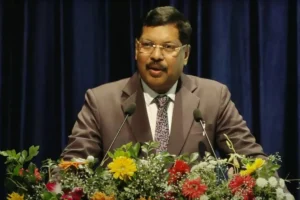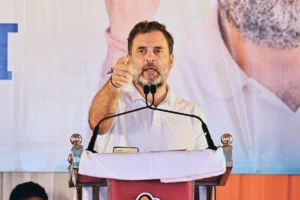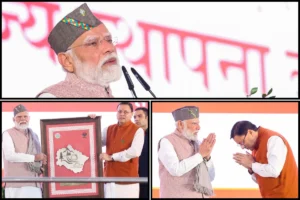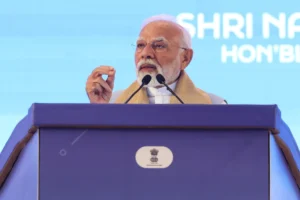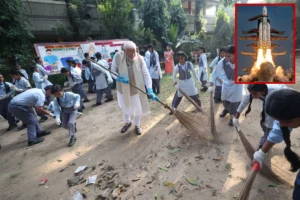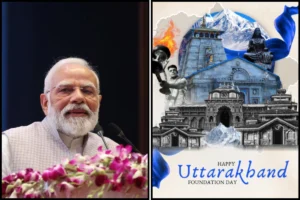
Terming Finance Minister Nirmala Sitharaman’s fifth Union budget as her best so far would not be an overstatement. The last full budget before the next year’s general elections presents an inclusive growth model and chalks out a roadmap for reaching the target of a $ 5 trillion economy.
The Finance Minister’s vision for development is reflected in seven priority areas laid down in the budget or “Saptrishi” as she called them. These are namely inclusive growth, Reaching the Last Mile, Infrastructure and Investment, Unleashing the Potential, Green Growth, Youth Power and boost to the Financial Sector. Sitharaman has catered to every section of society rising above caste, religion, region and other divisions.
Remarkably, the Union Budget has successfully resisted the populist temptations ahead of the 2024 polls. While it came as a big relief to the middle class in the form of tax exemptions but it was overdue for the past eight years. The exemptions apply only to the new tax regime that was started in 2020 and tax slabs remain unchanged for those opting for the older filing system. With the raising of the income limit for the exemption to Rs 7 lakh, the intent seems to be to gradually shift to the new system.
The budget doesn’t leave behind even the rich class in handing out tax sops. The rationale behind the move is to provide more disposable income to people at a time when domestic consumption is likely to be a key factor in bucking the global trend of economic slowdown.
Unemployment remains a big challenge for the country. Notwithstanding that the word “employment” found mentioned only four times in Sitharaman’s speech, several measures have given new hope to the country’s youth. The announcement to provide a stipend to 47 lakh young citizens for three years under the pan-India National Apprenticeship Scheme (NAS) is a significant step in this direction. The budget entails the opening of 30 Skill India Centres across the country along with the launching of the PM Skill Development Scheme 4.0.
The budget lays a special emphasis on growth.
The magnanimous allocation of Rs 2.40 lakh crore for the Railways will further fuel the modernization of the country’s lifeline. Likewise, a sizeable increase of 33 per cent in infrastructure spending is aimed at providing a much-needed impetus to growth. The total allocation to this sector now stands at a whopping Rs 10 lakh crore. Both these steps will go a long way in raising job opportunities across the country. Equally significant are the decisions to provide long-term interest-free loans to the states and change in tax rates. The total amount for the interest-free loans to the states has now been increased from Rs 1 lakh crore to Rs 1.3 lakh crore.
Nirmala Sitharaman’s team has also focused on fiscal prudence as the budget presents a step-by-step approach to reducing the fiscal deficit. The government has reiterated its commitment to keep the deficit within 6 per cent of the GDP while hoping the states will keep it at a 3.5 per cent level. A relatively improved performance by states on this count in recent years has given the centre more space to spend on infrastructure development.
The Modi government’s strategy has been to utilize the money in banks to spur growth. Indian banks are out of the dark shadows of the non-performing asset (NPA) crisis to follow suit. Multiple insurance holders or the ones with insurance worth more than Rs 5 lakh will now be taxed. At the same time, people will get tax relief on the amount they receive at the time of retirement. Both decisions will provide more liquidity for growth.
The budget does not divert from the Modi government’s commitment to public welfare. The food distribution scheme has been extended for a year. The budget also provides for a separate allocation for the tribal groups.
Several other measures like the opening of the Eklavya Residential schools for tribal children have silenced critics. Few have complained about the tax hike of five per cent on precious metals like gold, silver and platinum, raising customs duty on artificial jewellery and an additional 16 per cent tax on cigarettes.
The government has not ignored farmers either. The total sum for the farmers’ credit card has been increased by 1.5 lakh crore to Rs 20 lakh crore. Other announcements for the sector include the formation of an Agricultural Accelerator Fund to promote agriculture startups, providing Rs 6,000 crore for the PM Fisheries Scheme, a proposal for Institutes of Millets and encouraging one crore farmers to adopt organic farmers in the next three years.
The agriculture sector budget gets a raise of Rs 1,000 crore to stand at Rs 1.25 lakh crore for the fiscal year 2023-24. The government has declared the computerization of 63,000 Cooperative bank societies to help farmers. Millet farming will be promoted under the Shree Anna initiative.
Nirmala Sitharaman’s budget has succeeded in striking a balance between income tax and corporate tax for revenue generation. Both are projected to contribute by 15-15 per cent to the total collection while GST’s share is likely to be 17 per cent. It is by no means a small achievement. Nevertheless, rising debt remains an area of concern. It has now reached 34 per cent of the total budget.
India remains a beacon of hope for global investors with a projected growth of around 7 per cent. The Union Budget has added not only to these hopes but also raised the expectations of the common citizens. This is the reason even the massive Adani debacle has not affected the other listings in the share market. The faith of domestic and global investors remains intact in the Indian market. In a nutshell, this budget will be a stepping stone in realizing the country’s cherished dream of entering the developed world.









